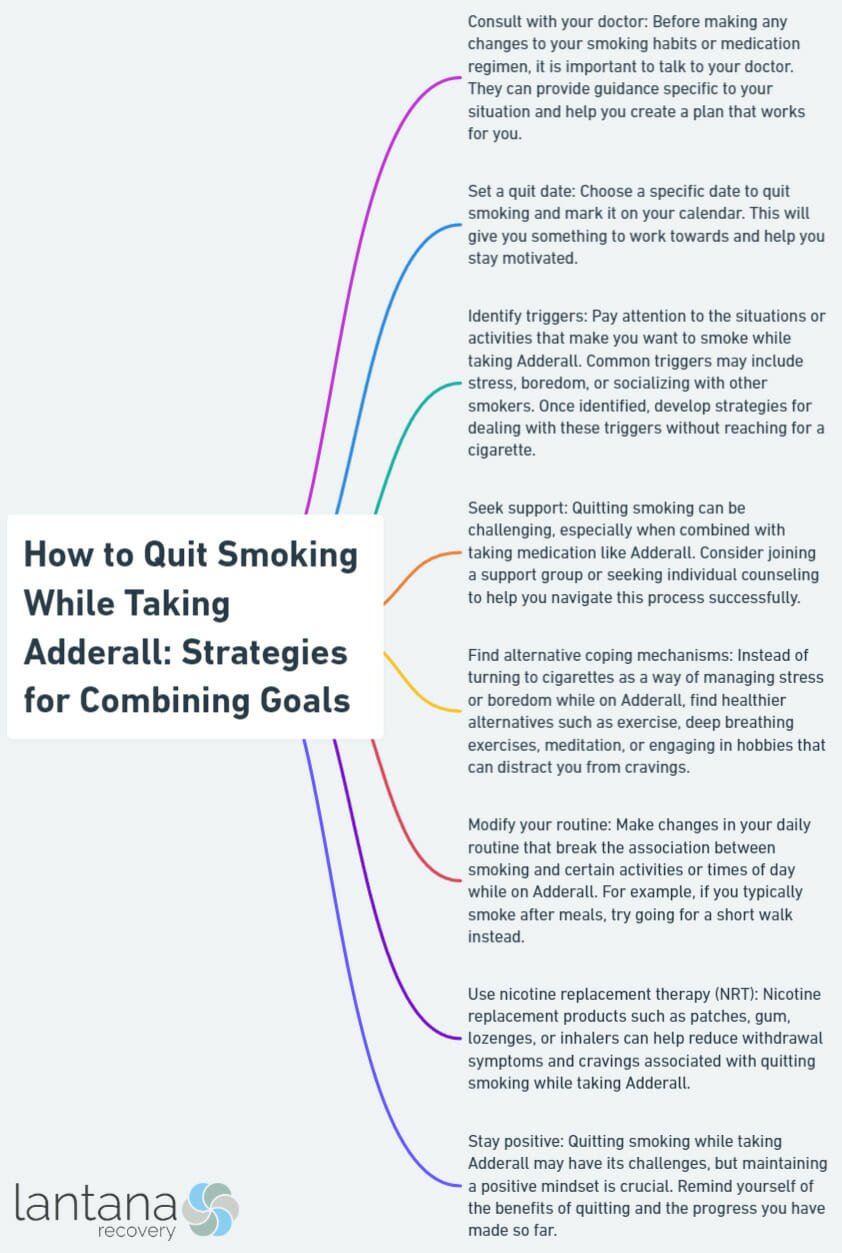Quitting smoking is a challenging endeavor on its own, but when combined with taking medication like Adderall, it can seem even more daunting. However, with the right strategies and approach, it is possible to successfully quit smoking while taking Adderall. Understanding the unique challenges and effects that both nicotine addiction and Adderall can have is crucial in developing an effective plan to achieve both goals simultaneously. This article will explore the factors involved in quitting smoking while taking Adderall and provide strategies for overcoming these challenges. With the right information and support, you can navigate this journey and successfully quit smoking while managing your medication.

Understanding the Challenges of Quitting Smoking
Quitting smoking while taking Adderall can be a challenging endeavor, and it’s important to understand the specific hurdles involved. In this section, we will delve into the challenges of quitting smoking, including nicotine addiction, psychological dependence, and physical withdrawal symptoms. By exploring these factors, we can gain valuable insights into the complexities of overcoming a smoking habit while managing the use of Adderall medication. So, let’s uncover the unique difficulties that arise when combining these two goals.
Nicotine Addiction
Nicotine addiction is an incredibly powerful force that poses a significant challenge when attempting to quit smoking. Gaining a deep understanding of the impact of nicotine addiction is absolutely crucial, particularly when trying to quit smoking while concurrently taking Adderall.
Nicotine addiction occurs when the body develops a dependence on the nicotine found in cigarettes. This addiction is both physical and psychological. On a physical level, nicotine stimulates the brain’s pleasure center, resulting in feelings of relaxation and reduced stress. Psychologically, smoking becomes intertwined with specific activities or emotions, leading to intense cravings when triggered.
The addictive nature of nicotine contributes to the difficulty of quitting smoking. Many individuals experience withdrawal symptoms, including irritability, restlessness, and intense cravings. These symptoms can feel overwhelming and make it incredibly challenging to resist the urge to smoke.
When using Adderall, it is imperative to consider how nicotine addiction may interact with the medication. Adderall is commonly prescribed for ADHD and can enhance focus and concentration. However, nicotine also has the potential to improve focus and attention, possibly leading to a reliance on both substances.
In order to successfully quit smoking while taking Adderall, it is vital to develop a comprehensive strategy that addresses both the nicotine addiction and the unique challenges of quitting. This may involve seeking professional assistance, such as exploring medication options and participating in behavioral therapy. Additionally, making positive lifestyle changes and building a strong support network can greatly aid in overcoming nicotine addiction.
Fact: Nicotine is an incredibly addictive substance and one of the most challenging addictions to overcome. Statistics from a cross-sectional study in Shanghai, China show that around 70-80% of people who attempt to quit smoking on their own end up relapsing within the first six months, highlighting the crucial importance of seeking support and assistance throughout the quitting process.
Psychological Dependence
Psychological dependence plays a crucial role when quitting smoking while using Adderall. It is important to understand some key points regarding this aspect:
– Addiction mindset: Smoking can become deeply ingrained in one’s daily routine and behaviors, resulting in a strong reliance on cigarettes. The brain forms associations between smoking and activities or emotions, making it more challenging to quit.
– Cravings and triggers: Psychological dependence often shows up as intense cravings for cigarettes triggered by specific situations, emotions, or habits. Overcoming these cravings can be difficult without proper strategies and support.
– Reward system: Nicotine stimulates the release of dopamine, a neurotransmitter associated with pleasure and reward. As a result, the brain becomes accustomed to this stimulation, making it tough to quit smoking as the brain yearns for those pleasurable sensations.
– Emotional stability: Smoking can serve as a coping mechanism for managing stress, anxiety, or other emotional challenges. When attempting to quit, these emotional triggers can become even more intense, highlighting the need to find alternative strategies for emotional well-being.
To effectively address psychological dependence, it is crucial to take a comprehensive approach that addresses both the physical and psychological aspects of quitting smoking. Here are some suggestions for overcoming psychological dependence:
– Seek support: Join support groups, enlist the help of friends and family, or consider therapy to address the emotional aspects of quitting.
– Identify triggers: Recognize the situations, emotions, or habits that trigger cravings and develop alternative coping mechanisms to effectively manage them.
– Replace smoking with healthier alternatives: Find activities or hobbies that can serve as distractions and help manage stress without relying on cigarettes.
– Practice self-care: Focus on taking care of your mental and emotional well-being by engaging in activities that promote relaxation and reduce stress.
By addressing the psychological dependence on smoking, you can increase your chances of successfully quitting while taking Adderall. Combining medical support, therapy, and lifestyle changes can provide a comprehensive approach to overcoming psychological dependence and achieving the goal of quitting smoking.
Physical Withdrawal Symptoms
Physical withdrawal symptoms are a common occurrence when attempting to quit smoking while taking Adderall. It’s important to note that these symptoms can be uncomfortable, but they can also be effectively managed. Here are some physical withdrawal symptoms that you should be aware of:
-
Cravings: It is not uncommon to experience intense cravings for nicotine, which can be overwhelming and make it challenging to resist the urge to smoke.
-
Irritability and Mood Swings: Quitting smoking can lead to irritability and mood swings.
-
Insomnia: Nicotine withdrawal may disrupt sleep patterns and lead to insomnia, making it more difficult to quit smoking.
-
Fatigue: Quitting smoking can cause fatigue and low energy levels.
-
Increased Appetite: Some individuals may notice an increase in appetite when they stop smoking.
It’s essential to remember that the severity and duration of physical withdrawal symptoms may vary for each individual. These factors can depend on how often and how long a person has been smoking, as well as individual differences in responding to nicotine withdrawal.
Developing effective coping strategies to manage physical withdrawal symptoms is crucial in increasing your chances of successfully quitting smoking while taking Adderall. Seeking support from healthcare professionals, considering medication options if necessary, and practicing self-care techniques can help minimize the impact of these symptoms on your journey to becoming smoke-free.
If you are interested in knowing about the co-occurring disorders linked to ADHD, read our article on Adderall and Schizophrenia to understand the connection between the two.

The Effects of Adderall on Quitting Smoking
Combining the desire to quit smoking with taking Adderall can present unique challenges. In this section, we’ll explore the effects of Adderall on quitting smoking and how it can impact various aspects of the quitting process. From the impact on nicotine cravings to managing anxiety and stress, as well as combating fatigue and lack of focus, we’ll uncover valuable insights to help you navigate this journey successfully. So let’s dive in and discover the complexities and strategies for overcoming this dual challenge.
Impact on Nicotine Cravings
Adderall plays a significant role in reducing nicotine cravings during the process of quitting smoking. It’s important to note that Adderall is a medication commonly prescribed for attention deficit hyperactivity disorder (ADHD) as it impacts the neurotransmitters in the brain.
1. Reduction of Nicotine Cravings: By altering dopamine levels in the brain, Adderall effectively reduces cravings. Dopamine is a neurotransmitter associated with pleasure and reward, and when nicotine is consumed, it leads to an increase in dopamine release, resulting in cravings. However, Adderall helps regulate dopamine levels, thereby lessening the intensity of cravings and making it easier to resist the urge to smoke.
2. Enhancement of Willpower: One of the advantages of Adderall is its ability to enhance focus and concentration. By boosting willpower, it empowers individuals to quit smoking and stay motivated and committed to their goal. With Adderall’s assistance, resisting temptation becomes easier.
3. Supportive Role in the Quitting Process: Adderall can also be beneficial in managing withdrawal symptoms such as mood swings and irritability that commonly occur during the quitting process. By reducing these symptoms, Adderall creates a more comfortable experience while individuals strive to quit smoking.
4. Professional Guidance: It is important to consult a healthcare professional before combining Adderall with smoking cessation efforts. They can provide valuable guidance regarding potential benefits and risks based on an individual’s specific circumstances and medical history.
5. Individual Variations: It should be noted that the impact of Adderall on nicotine cravings can vary from person to person. Factors such as dosage, treatment duration, and personal response need to be considered when assessing its effects.
Understanding how Adderall affects nicotine cravings allows individuals to make informed decisions and develop effective strategies for quitting smoking while taking this medication. Remember to seek professional advice and support throughout the quitting process.
Managing Anxiety and Stress
Managing anxiety and stress is crucial when quitting smoking while taking Adderall. Here are some natural strategies to get rid of anxiety from Adderall and nicotine cessation:
1. Practice relaxation techniques: Engage in deep breathing exercises, meditation, or yoga to naturally reduce anxiety and stress.
2. Exercise regularly: Regular physical activity naturally relieves stress and improves mood. Aim for at least 30 minutes of moderate-intensity exercise most days.
3. Seek support: Surround yourself with a supportive network of friends, family, or a support group. Talking to others going through similar experiences naturally provides comfort and encouragement.
4. Manage time effectively: Create a schedule and prioritize tasks to naturally reduce stress levels. Break tasks into smaller, manageable steps for a less overwhelming feeling.
5. Avoid triggers: Identify and naturally avoid situations, people, or places that may trigger cravings or increase stress levels. Find healthier ways to naturally cope with stress, such as engaging in enjoyable hobbies or activities.
By incorporating these strategies into your daily routine, you can effectively manage anxiety and stress while working towards your goal of quitting smoking. Remember to consult your healthcare provider for personalized advice and guidance throughout your journey.
Combating Fatigue and Lack of Focus
When facing fatigue and a lack of focus while trying to quit smoking and taking Adderall, it is essential to incorporate several effective strategies. These include ensuring sufficient sleep, staying hydrated, engaging in regular exercise, consuming a balanced diet, and taking short breaks throughout the day. Additionally, it is crucial to seek guidance and personalized advice from healthcare professionals or smoking cessation specialists. It is important to remain committed, positive, and reach out for support when needed in order to find the right balance and combination of strategies.

Strategies for Quitting Smoking while Taking Adderall
Trying to quit smoking while taking Adderall? Look no further! We’re diving into some powerful strategies for achieving this dual goal. In this section, we’ll explore medication options and professional consultation, uncover the effectiveness of behavioral therapy and support, and reveal the transformative impact of lifestyle changes. Say goodbye to the smoking habit while staying on track with your Adderall journey – it’s time to take charge of your health and well-being!
Medication Options and Consultation
To quit smoking while taking Adderall, it’s important to consider medication options and consultation. Here are some important points:
1. Consult with a healthcare professional: Consult a doctor or psychiatrist who can assess your needs and guide you on suitable medications for quitting smoking. They will consider your medical history, current medication regimen, and any potential interactions with Adderall.
2. Nicotine replacement therapy (NRT): NRT provides controlled doses of nicotine to reduce withdrawal symptoms and gradually wean off nicotine dependence. Options include gum, patches, inhalers, sprays, and lozenges. Consultation can help determine the most appropriate NRT method for you.
3. Prescription medications: Healthcare professionals may recommend medications like varenicline or bupropion to reduce cravings and withdrawal symptoms. However, be aware of potential interactions or side effects.
4. Behavioral support and counseling: Alongside medication, counseling and support groups can enhance the chances of quitting smoking. These interventions provide techniques to manage cravings, cope with triggers, and offer ongoing support.
Consultation with a healthcare professional is crucial in determining suitable medications and strategies. They can provide personalized guidance tailored to your needs. Studies show that combining medications with behavioral support increases quitting success rates. Seek professional advice and support to increase your chances of breaking free from smoking addiction.
Behavioral Therapy and Support
Behavioral therapy and support play a vital role in the process of quitting smoking while taking Adderall. By actively participating in behavioral therapy, individuals can enhance their motivation to quit by reshaping their thoughts and behaviors related to smoking. Support networks are crucial as they provide encouragement and hold individuals accountable for their actions. Additionally, relapse prevention techniques can help individuals anticipate and handle setbacks, while having realistic expectations acknowledges the challenging nature of the quitting process.
Consistent communication with healthcare professionals and support networks is important as it provides guidance and reinforcement. By actively engaging in therapy and seeking support, individuals can significantly increase their chances of achieving long-term success in overcoming nicotine addiction.
Results from a recent randomized clinical trial on the effectiveness of CBT for ADHD reported that, “CBT + medication resulted in greater improvements than CBT alone in ADHD symptoms, organizational skills, and self-esteem.” (Efficacy of Cognitive Behavioral Therapy With and Without Medication for Adults With ADHD: A Randomized Clinical Trial, Cherkasova et al., 2020)
Lifestyle Changes
Quitting smoking while taking Adderall can be achieved by making lifestyle changes. Here are important changes to consider:
- Identify triggers: Pay attention to situations, people, or activities that make you crave cigarettes. Find ways to avoid or minimize exposure to them.
- Develop new habits: Replace smoking with healthier alternatives. Engage in exercise, reading, or hobbies to distract from cravings. Find new ways to relieve stress and relax, such as practicing mindfulness or deep breathing exercises.
- Change your social circle: Surround yourself with supportive and non-smoking individuals who can encourage and motivate you to quit. Avoid spending time with friends or acquaintances who smoke, as it may tempt you to relapse.
- Create a smoke-free environment: Remove all smoking paraphernalia, such as ashtrays, lighters, and cigarettes from your home, car, and workplace. Thoroughly clean your living spaces to eliminate the smell of smoke, which can act as a trigger.
- Find healthy distractions: Instead of reaching for a cigarette, find healthy distractions to keep your mind occupied. Engage in physical activities, spend time with loved ones, or indulge in hobbies that bring you joy and fulfillment.
By implementing these lifestyle changes, you can improve your chances of successfully quitting smoking while taking Adderall. Remember, quitting smoking is a journey that requires determination and perseverance. It can lead to improved physical and mental well-being.

Tips for Success in Combining Goals
Combining goals can be a daunting task, but when it comes to quitting smoking while taking Adderall, there are strategies that can help you succeed. In this section, we will explore some valuable tips that can pave the way to your success. From setting realistic expectations to building a support network, coping with cravings and triggers, to celebrating milestones and achievements, these tips will empower you on your journey to achieving your goals. So, let’s dive in and discover how you can conquer the challenge of combining these two objectives.
Setting realistic expectations
- Understanding the process: Quitting smoking while taking Adderall is challenging. It is important to set realistic expectations and recognize that quitting smoking may take time.
- Accepting the timeline: Setting realistic expectations involves acknowledging that quitting smoking is a gradual process. It is important to be patient and not become discouraged if progress is slower than anticipated.
- Managing cravings: Expect nicotine cravings, especially in the early stages of quitting. It is important to have strategies in place to cope with these cravings and resist the urge to smoke.
- Being prepared for withdrawal symptoms: Realistically, quitting smoking can result in physical and psychological withdrawal symptoms. These symptoms may include irritability, anxiety, and difficulty concentrating.
- Seeking support: Recognize that quitting smoking can be challenging and seeking support from healthcare professionals, support groups, or loved ones can greatly increase the chances of success.
- Celebrating small milestones: Acknowledge and celebrate small achievements along the way. This can include going a day without smoking, resisting a craving, or reaching a specific timeframe since quitting.
- Staying motivated: Keep in mind the reasons why quitting smoking is important to you. These reasons can serve as motivation during difficult times and help maintain focus on the goal.
- Maintaining a positive mindset: Understand that setbacks may occur on the journey to quitting smoking. Instead of giving up, focus on the progress made and use setbacks as learning opportunities.
Building a support network
Building a support network is crucial when quitting smoking while taking Adderall. Surround yourself with individuals who understand and support your goals. Here are key reasons why a support network is important:
1. Encouragement: A support network provides the motivation needed to stay on track with quitting smoking. They can remind you of your reasons for quitting and provide positive reinforcement during challenging times.
2. Accountability: A support network holds you accountable for your actions. They help you stick to your plan and remind you of the commitment you made to yourself.
3. Shared Experiences: Being part of a support network allows you to connect with others who are going through a similar journey. Hearing success stories from those who have successfully quit smoking while taking Adderall can provide inspiration and guidance.
4. Emotional Support: Quitting smoking can be emotionally challenging. A support network provides a safe space to express your feelings and receive emotional support from people who understand.
5. Practical Advice: Your support network can offer practical strategies for dealing with cravings, managing stress, and staying focused on your goal of quitting smoking.
Remember, a support network does not guarantee success, but it significantly increases your chances of quitting while taking Adderall. Reach out to friends, family, or seek online support groups to help you on your journey.
Fact: According to a research on the benefits of peer support groups in addiction recovery, individuals with a strong support network are more likely to successfully quit smoking compared to those who try to quit alone.
Coping with cravings and triggers
When quitting smoking while taking Adderall, it is essential to focus on coping with cravings and triggers. Here are some strategies that can help you navigate these challenging moments:
1. Identify triggers: Pay close attention to situations, activities, or emotions that cause you to crave a cigarette. Recognizing these triggers will enable you to better prepare yourself to cope with the cravings.
2. Create a plan: Develop an action plan for when cravings strike. This plan may include finding healthier alternatives such as chewing gum or going for a walk. Distracting yourself with a hobby or engaging in an activity can also help.
3. Breathe deeply: When cravings hit, try taking slow, deep breaths. Deep breathing can effectively reduce stress and anxiety, ultimately making it easier for you to resist the urge to smoke.
4. Stay hydrated: Drinking plenty of water can alleviate cravings. Additionally, it can keep your mouth and hands occupied, which proves helpful when dealing with oral fixation.
5. Reach out for support: Share your struggles and successes with supportive friends, family members, or a support group. Talking to someone about your experience can provide you with encouragement and accountability.
Fact: Regular physical activity has been proven to reduce cravings and withdrawal symptoms when quitting smoking.
Celebrating milestones and achievements
Quitting smoking while taking Adderall requires acknowledging and commemorating milestones and achievements to remain motivated and sustain progress. In order to do this, it is important to set realistic goals and establish timelines for quitting smoking. For instance, you can identify a specific number of smoke-free days or weeks as a significant milestone. Once you successfully reach that milestone, take the time to celebrate by rewarding yourself or expressing self-appreciation.
Creating a strong support network is essential throughout this journey. Share your progress with understanding friends, family, or a support group who can validate and encourage you. It is helpful to have individuals around you who comprehend the challenges of quitting smoking and can join in celebrating your accomplishments.
Effectively managing cravings and triggers is an achievement worth acknowledging. Recognize your ability to resist cravings and handle situations that would normally tempt you to smoke as a cause for celebration and a source of personal pride.
Lastly, it is important to celebrate milestones and achievements by recognizing the positive impact they have on both your physical and mental well-being. Acknowledge the improvements in your lung health, increased energy levels, and enhanced focus that result from quitting smoking.

Frequently Asked Questions
Question 1: Can I quit smoking while taking Adderall?
Answer: Yes, it is possible to quit smoking while taking Adderall. In fact, a study has shown that ADHD medication, such as Adderall, may be effective in reducing smoking and withdrawal symptoms in individuals with ADHD.
Question 2: How does ADHD medication help with smoking cessation?
Answer: ADHD medication, like Adderall, may mimic some of the effects of nicotine and help smokers with ADHD during smoking cessation. Previous research has shown that nicotine reduces symptoms and negative moods in individuals with ADHD. ADHD medication can improve task performance, reduce withdrawal symptoms, and decrease nicotine intake during abstinence, particularly in stressful situations.
Question 3: What other strategies can I use to quit smoking while taking Adderall?
Answer: In addition to taking ADHD medication, there are several other strategies you can use to quit smoking. These may include nicotine replacement therapy, counseling or support groups, behavioral therapy, and developing coping mechanisms to deal with stress and cravings. It is important to consult with your healthcare provider at an outpatient drug rehab for personalized advice and assistance.
Question 4: Are there any specific prescription drugs that can help me quit smoking while taking Adderall?
Answer: Yes, there are specific prescription drugs that can aid in smoking cessation while taking Adderall. Two commonly used drugs are varenicline (Chantix) and bupropion. Varenicline interferes with nicotine receptors in the brain and has shown effectiveness in quitting smoking. Bupropion helps reduce tobacco withdrawal symptoms. It is essential to discuss these options with your healthcare provider to determine the most suitable approach for you.
Question 5: What are the side effects of varenicline and bupropion?
Answer: The side effects of varenicline may include nausea, trouble sleeping, and changes in behavior or mood. Bupropion may cause side effects such as dry mouth, constipation, and changes in appetite. It is crucial to discuss any medical conditions and allergies with your healthcare provider before starting either medication.
Question 6: Where can I find additional support and resources for quitting smoking and managing ADHD?
Answer: There are various resources available to support your efforts in quitting smoking and managing ADHD. You can contact SAMHSA’s National Helpline at 1-800-662-HELP (4357) for treatment referrals and information. The helpline is available 24/7, 365 days a year and offers referrals to local treatment facilities and support groups. Additionally, the American Cancer Society’s cancer helpline and National Cancer Information Center provide support and valuable services for individuals dealing with cancer, including information on quitting tobacco and getting involved in supporting the fight against cancer.









